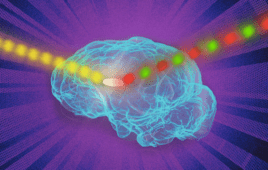
This micrograph shows pancreatic ductal adenocarcinoma (the most common type of pancreatic cancer). [Image by KGH – Own work, CC BY-SA 3.0]
Pancreatic cancer is one of the most lethal forms of cancer. About 53,670 people are expected to be diagnosed with pancreatic cancer this year with 43,090 dying from it, according to the American Cancer Society. The lifetime risk of developing pancreatic cancer is about 1 in 65 but can be reduced by knowing the risk factors.
The risk factors for pancreatic cancer that can be changed include smoking, being overweight and exposure to certain chemicals. The risk factors that are out of our control are age, gender, race, family history, diabetes, chronic pancreatitis, cirrhosis of the liver and stomach problems.
In collaboration with scientists from the University of Texas M.D. Anderson Cancer Center and Tianjin Medical University General Hospital in China, Wake Forest Baptist scientists studied the micro RNA molecule MIR506. It is naturally produced in the human body and in the past has been used as a suppressor for cancer tumors. It has also increased the effectiveness of chemotherapy for ovarian cancer.
MIR506 usually regulates cell behavior. A moderate amount of it helps cells function normally. When there is a decrease in levels, cell growth and expansion can occur in tumors.
The study took samples from tumors during surgery and implanted them into mice to grow new pancreatic cancer tumors.
“By using an animal model to expand tumor cells recently remove from patients, we hope to re-create more closely what actually happens in patients with pancreatic cancer rather than by using existing artificial cell lines,” said Wei Zhang, Ph.D., a Hanes and Willis Family Professor in cancer at Wake Forest School of Medicine and principal investigator on the study, in a press release.
MIR506 levels were lower in the tumor compared to a non-cancerous pancreas. With this knowledge, the scientists treated the tumor cells in the mice with MIR506 to see if it would behave the same way it did with ovarian cancer.
Treating the pancreatic cancer cells with MIR506 impeded malignant cell growth and the cellular process that metastasizes cancer.
The researchers also found that treating the pancreatic tumor cells with the micro RNA helped induce autophagy, which is a process that removes aggregated proteins, clears damaged organelles and eliminates intracellular pathogens, according to a Health and Human Services research paper.
The research was funded by the National Institutes of Health/National Cancer Institute, National Foundation for Cancer Research and the Skip Viragh Family Foundation. It was published online in April issue of the Autophagy journal.
[Want to stay more on top of MDO content? Subscribe to our weekly e-newsletter.]




